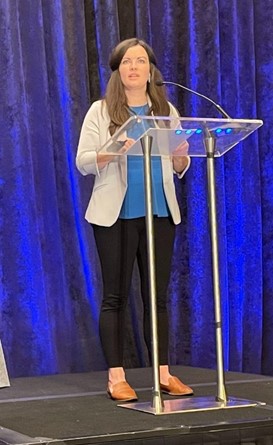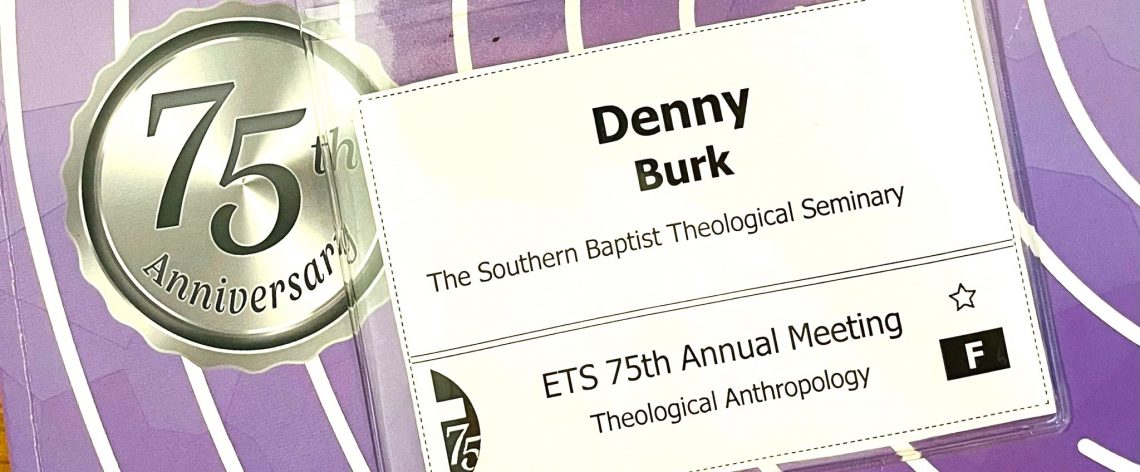Another annual meeting of the Evangelical Theological Society (ETS) is now in the books. We met last week in San Antonio, and I heard a lot of talk about the basement of the Alamo. I was so busy with meetings, however, that I never made it over. Seriously though, for those of you unfamiliar with ETS, it is a society of theologians and biblical scholars who are dedicated to biblical inerrancy and a belief in the Trinity. At the annual meeting, members come together to present academic papers, meet with publishers, and catch up with old friends. Keep in mind that I only experienced a narrow slice of things, but here are my reflections on what I saw.
1. Shall We Call God Mother?
On Wednesday afternoon, I made a beeline for a session devoted to engaging Amy Peeler’s book Women and the Gender of God: The Virgin Birth and Jesus’ Maleness (Eerdmans, 2022). I read and reviewed Peeler’s controversial book earlier this year, so I was very interested to see how this discussion might go.
The book is controversial for a number of reasons, not least of which is Peeler’s contention that we ought to address God as Mother (at least sometimes!). Peeler also denies eternal generation as the primary grounds for naming God as Father (p. 114). She rejects that God’s eternal “nature” determines His self-disclosure as Father (p. 113). She contends that eternal generation could just as well be expressed by “Mother” or “Parent” (p. 115). Peeler contends that Father/Son language is a result of the trinitarian economy but not proper to the eternal relations of origin themselves. In my view, this is the fundamental error that puts her at odds with the tradition.
John Clark talks about some glaring problems in the book in his own review for Touchstone,
This should bring doctrinally astute Christians to a grinding halt. God is not Father because he causes a pregnancy unless the Son is Son of the Father only because of that pregnancy. The Father does not derive fatherhood from Mary’s motherhood, nor does Jesus call the Father “Father” because that happens to be his favorite moniker among apt alternatives. It is no nominalist trope to call Jesus the Son of the Father, but an ontological reality assuring us that who God reveals himself to be is who God has ever been in his eternal inner triune life. This is the heart of Nicene orthodoxy—the ground and grammar of the church’s trinitarian faith, and normative to our knowledge of the gospel and the gospel’s God.
Anyone who fails to reckon with this particular line of critique simply isn’t taking Peeler’s argument very seriously. Her argument really does suggest a fairly significant revision to Nicene Trinitarianism and Chalcedonian Christology.
Except for Schreiner, the reviewers left such issues largely unexamined. Sandra Glahn, for example, passed over these theological problems and praised Peeler for taking the questions of critical gender theorists seriously. Glahn showed far more sympathy to gender theorists and their concerns than she did for those who had detected Trinitarian and Christological problems in the book. Indeed, Glahn said that she would have liked for Peeler to interact even more with critical theorists of gender.
To Peeler’s credit, she had heard from other reviewers and colleagues before coming to the ETS meeting and had already taken on board some of their more substantive concerns. Indeed, she made several surprising retractions in the course of her presentation and subsequent Q&A. I don’t know if she ever read the review that I wrote, but she retracted several of the items that I highlighted, including the idea that eternal generation can be named by “parent” or “mother.” She also backed off her claim that Jesus was able to represent male and female because his body includes both male and female within it. She admitted that she had not defined key terms carefully, especially the term “gender.”
I was surprised to hear Peeler walk back so many of the points that are central to the argument of her book, but walk them back she did. I’m wondering if she will make any of those retractions public? Perhaps she will. Nevertheless, she’s not walking back her contention that at least some of our prayers should address God as “mother.”
2. An Electoral Sweep
I joined many others in welcoming Karen Jobes as president during the business meeting on Thursday, marking the first time a woman has served in this position of leadership over the society. Christianity Today reports that her election is the result of one small group’s years-long effort to increase female participation in ETS. The group is led by Christa McKirland, a well-known writer for Christians for Biblical Equality and one of the editors of the third edition of the landmark egalitarian work Discovering Biblical Equality (IVP, 2021).
This group started out as a Facebook group for female scholars, but now has grown into an annual meeting called the “ETS Women’s Networking Event.” According to CT, the group actively organizes to elect people to the presidential nominating committee. ETS solicits corporate sponsorships for the group at a rate of $2,500 a pop. If I am reading the document correctly, ETS collected $7,500 worth of sponsorships in 2023 for the Women’s Networking group.
According to CT, the effort began after a 2014 study by Christians for Biblical Equality showed that women were “marginalized” in the ETS. Dan Wallace referred to this in his 2016 presidential address when he admonished members that the ETS is not the “Evangelical Complementarian Society.” He concluded, “I pray that we can get past our insecurities, and fears of other viewpoints, and ennoble our brothers and sisters who may disagree with us” (emphasis his).
CT reports that the ETS women’s group backed three candidates for the all-important nominations committee (which selects the president of ETS), and they were able to get all three of their candidates elected. From the report:
“The group, which is currently run by Carey Baptist College theology professor Christa McKirland and a leadership team, now has nearly 600 members. It has also actively organized to elect people to the presidential nominating committee. This year, the group supported Imes, Trinity Evangelical Divinity School New Testament chair Dana Harris, and Midwestern Baptist Theological Seminary biblical studies professor Andrew King.”
I’m all for organization. There is no problem at all with members organizing to get their preferred candidates elected. I do, however, have questions about ETS soliciting sponsorships for any group that is organizing political support for elections to leadership. That would seem to me not a good use of ETS’s website and convening authority. In other words, if a group is going to be organizing for elections, I would prefer that ETS not put its hand on the scale one way or the other for that group. Soliciting donations for such groups seems to me problematic. Maybe that will change in future meetings.
3. Tom Schreiner and Andrew Bartlett Debate Complementarianism/ Egalitarianism
On Wednesday morning, I attended a session devoted to a debate about complementarianism and egalitarianism. Tom Schreiner represented the complementarian side, and Andrew Bartlett the egalitarian. It was probably one of the most riveting sessions I’ve ever attended. This was due in large part to the format, which included no papers. Schreiner and Bartlett simply took turns answering tough questions. This is not a format that most presenters could carry, but Schreiner and Bartlett were loaded for bear.
Who won the debate? Surprise, surprise. I found Schreiner to be more convincing than Bartlett. At one point during the debate, they were discussing Ephesians 5. Bartlett was arguing for the “mutual submission” view of hupotasso in Eph. 5:21, and Schreiner was contending for the traditional view, which involves submission to proper authority. Schreiner pointed out that hupotasso appears explicitly in verse 24, which reads “as the church submits to Christ, so also wives should submit in everything to their husbands.” It didn’t make a dent at all. Bartlett maintained what appears to me a most implausible view exegetically—that submission has nothing to do with submitting to an authority.
I asked a question during one of the Q&A’s about hupotasso in Ephesians 5:22. I couldn’t tell that Bartlett was even aware of the textual issue there and its implications for the egalitarian view. As I have written elsewhere, if hupotasso appears in Ephesians 5:22 (and there is a convincing argument that it does), it undermines egalitarian claims about so-called “mutual submission” in Ephesians 5:21.
I’m grateful for a forum where the issues could be aired out respectfully. The ongoing disagreement, however, just goes to show that the debate between complementarians and egalitarians is far from over.
4. The Meaning of “One Flesh”
I presented a paper on Tuesday concerning the interpretation of “one flesh” in Genesis 2:24. Throughout the history of Christianity the “one flesh” union of marriage has been understood as a conjugal union—that is, that marriage is fundamentally sexual involving the covenanted union of the bodies of one man and one woman in a procreative bond. This understanding has prevailed over the last 2,000 years of church history in every branch of the Christian tradition—Roman Catholic, Orthodox, and Protestant.
Nevertheless, in the twentieth-century, revisionist accounts of marriage have appeared with many arguing that marriage is not necessarily a sexual union. Many who deny the conjugal nature of marriage adopt a novel interpretation of the phrase “one flesh” in Genesis 2:24. They view “one flesh” not as bodily union but as so-called “fictive kinship.” In his 2013 book Bible, Gender, Sexuality, James Brownson makes the “kinship” interpretation of “one flesh” the basis for his understanding and endorsement of so-called “gay marriage.” He argues that “The ‘one-flesh’ union spoken of in Genesis 2:24 connotes, not physical complementarity, but a kinship bond” (p. 32). Even one non-affirming scholar, Preston Sprinkle, makes the identical case in his 2015 book People To Be Loved (although he recently retracted that interpretation).
I argued against this stream of interpretation and showed that “one-flesh” in Genesis 2:24 denotes conjugal union, which means that marriage is irreducibly sexual. Without sexual union, a couple cannot enter into a marriage covenant. I got great questions at the end, including about people who through physical disability are unable to consummate.
5. Abigail Favale’s Plenary Address
 Abigail Favale’s plenary lecture was one of the best I’ve ever heard at ETS. Definitely top five for me. She is a Roman Catholic and spoke as an invited guest to ETS and not as a member. To say that her presentation was compelling would be an understatement. It was an absolute homerun. She exposed the bankruptcy of gender theory while upholding God’s revelation in the created order. It was basically a summary of the key points in her excellent book The Genesis of Gender: A Christian Theory (Ignatius, 2022). If you have not read this work, I cannot recommend it highly enough. I reviewed it here. When the audio of ETS sessions is released, this will be one that you’ll want to get.
Abigail Favale’s plenary lecture was one of the best I’ve ever heard at ETS. Definitely top five for me. She is a Roman Catholic and spoke as an invited guest to ETS and not as a member. To say that her presentation was compelling would be an understatement. It was an absolute homerun. She exposed the bankruptcy of gender theory while upholding God’s revelation in the created order. It was basically a summary of the key points in her excellent book The Genesis of Gender: A Christian Theory (Ignatius, 2022). If you have not read this work, I cannot recommend it highly enough. I reviewed it here. When the audio of ETS sessions is released, this will be one that you’ll want to get.
6. CBMW Dinner
Every year the Council on Biblical Manhood and Womanhood (CBMW) hosts a small banquet the night before ETS to engage and encourage complementarian scholarship. It is always such a rich time of fellowship and discussion with likeminded brothers and sisters. I first attended one of these when I was a Ph.D. candidate myself many years ago, and I am pleased that we are still able to continue this event. Dr. Jason Allen, president of Midwestern Baptist Theological Seminary, delivered a challenge to complementarian scholars, saying that they not only need to adhere to complementarian doctrine but to advocate for it in their work. It was really well done. It will be appearing in the Spring issue of Eikon. Keep your eyes peeled for that one.






